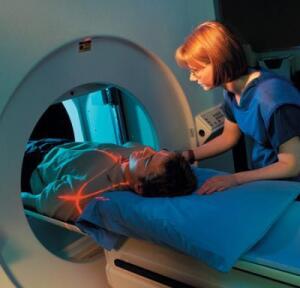Study: CT calcium scans can help stratify heart attack risk
by
Brendon Nafziger, DOTmed News Associate Editor | August 19, 2011

CT scans that measure calcium build-up in the coronary arteries can help predict who's at most risk for having a heart attack among moderate-risk populations and therefore would benefit most by taking statins, according to a study appearing in the current issue of The Lancet.
The study, which tracked nearly 1,000 patients for a median of nearly 6 years, said the sometimes-controversial calcium scans were able to further stratify risk among patients with normal LDL cholesterol levels but elevated high-sensitivity C-reactive protein, which rises with inflammation.
The research, led by Dr. Michael Blaha with Johns Hopkins in Baltimore, involved patients who would have been eligible for the JUPITER trial, which showed that these types of moderate-risk patients could benefit by taking statins, even though their absolute yearly risk for a heart attack was low.
In the current study, Blaha and colleagues found that coronary artery calcium (CAC) scores helped them more finely understand the risks. They said three-quarters of all coronary events befell the one-quarter of the patients with high CAC scores -- that is, above 100. The rate of a coronary event in this group was 20.2 per 1,000 person-years. By comparison, for the 444 patients in the study (47 percent) with CAC scores of 0, the rate of a coronary disease event was less than 1 per 1,000 person-years.
By their calculations, the researchers said you would need to treat only 24 patients with CAC scores above 100 with statins to prevent one coronary heart disease event over a 5-year period. But you would need to treat 549 patients with CAC scores of 0 to get the same effect.
However, taking into account C-reactive protein levels in this population had no effect on the risk, the researchers said.
"CAC seems to further stratify risk in patients eligible for JUPITER, and could be used to target subgroups of patients who are expected to derive the most, and the least, absolute benefit from statin treatment," write the authors. "Focusing of treatment on the subset of individuals with measurable atherosclerosis could allow for more appropriate allocation of resources."
But support for calcium scans is mixed. In an e-mail to Medpage Today, Dr. Steven Nissen with the Cleveland Clinic called calcium scanning an example of "medicine gone wild" and noted it has never been shown to reduce the risk of myocardial infarction or death. However, other doctors have defended it, with Dr. Carl Lavie, of the Ochsner Heart and Vascular Institute in New Orleans telling Medpage in an e-mail: "Now that CAC scoring is so inexpensive, one can make the case of testing this in most patients at intermediate risk."
The cost of the scan has fallen and is now about $100, according to the researchers.
|
|
|
You Must Be Logged In To Post A Comment
|
